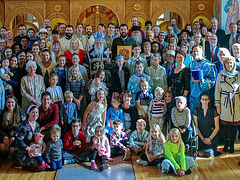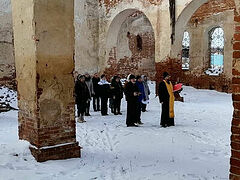Today we live in a world full of information, in which there are many psychosocial barriers that prevent our Orthodox contemporaries from developing spiritually. We also have to agree that there are still enough objective obstacles. In addition to the eternal problems inherent in any age, new factors have appeared that distract us from Christian practices. We will not only list them, but also try to find “access codes” to “crack” these problems.
Each era brought Christians its own difficulties in terms of churching. But first of all, we need to understand what it is. We will not consider the special rite of churching for babies brought to church on the fortieth day in imitation of the Jewish rite that Jesus Christ underwent. Moreover, this rite is rather a historical rudiment, which is gradually going out of practice. We will talk about churching as a process of integrating a new member into the sacred Body of the Lord called the Church. We are using the theological term deliberately so that there would be no feeling that we will be talking about some kind of corporate initiation.
In the first centuries of Christianity for these purposes the catechumenate was established, which gradually introduced the convert into the complex realm of the Church. The person was not yet a Christian, but was already becoming part of a large family, where they were beginning to nurture him spiritually. Firstly, he underwent an educational course that could last from several months to several years. Secondly, he went through liturgical practice in the church, being present at the Liturgy up to a certain point. Thirdly, he received spiritual support after his Baptism. This activity was carried out by people whom today we call godparents, whose participation in their godchildren’s churching in our days is often a travesty of the role of real godparents.
Legal Christianity
Initially, godparents were considered in the Church as mentors, who became “coordinators” from among experienced Christians and were attached to new Christians of all ages, and not just to babies. They played the role of “navigators” in the “universe” of Orthodox Christianity. This was the very guidance and care of new members of the Church that helped them become churched, especially in the face of persecution. Over time, it transformed into the practice of godparents in the modern sense, who today are often chosen from among absolutely unchurched relatives or friends. It began with a overtly good action—the legalization of Christianity by the Edict of Milan.
When the persecution stopped, and Christianity became the state religion in the Roman Empire, the number of members of the Church began to increase noticeably, with monastic life and spirituality actively developing. Experienced fathers-confessors from among priests and monks became mentors, and the place of godparents began to be occupied by believers close to the families of the newly baptized.
Also, the phenomenon of honorary godparents from among nobles began to take shape. New members of the Church sought to become related with nobles in order to get high-ranking patrons who, in fact, were not engaged in the spiritual development of their godchildren. But it was compensated by the fact that churching in a Christian society went on by itself, since the system of upbringing and education was entrusted to the Church.
An exotic faith
During the Christianization of Rus', our ancestors adopted this model from the Byzantine Empire, so educational institutions in Russia were opened under the wing of the Church as well. The most surprising thing is that the clericalization of the education system had the opposite effect. Gradually living faith began to be emasculated in theological schools, seminaries and academies. As Metropolitan Benjamin (Fedchenkov) testified, before the Russian Revolution in religious educational institutions a believing teacher was regarded as exotic. Nihilists and atheists graduated from these schools and participated in protest rallies, and their students were almost the first to hoist the banner of the revolution on the roofs of theological academies.
Further devaluation of godparents in Russia began with the atheistic Soviet era. Moreover, then the education system was thoroughly purged of Church influence, which means that the source of churching eventually dried up. People understandably feared contact with religion because of possible problems at work. According to the stories of old priests, Baptisms were often performed secretly in apartments and often without godparents, since there were few such risk-seekers. At most, the parents or even grandparents of those being baptized who had nothing to lose, were present. It was they who became godparents—often nominal ones. But Baptisms in the era of persecution are always full of exceptions. In addition, the pressure of the State machine was a kind of filter that tested the seriousness of Soviet believers’ intentions.
The distorted custom of having godparents
Today, the Russian Church is making feeble attempts to improve the whole situation, despite the fact that the secular education system is still dominated by secular ideas. Sunday schools and separate theological courses do not solve the problem. Although preparatory talks before Baptisms and Weddings were introduced, things are still right where they started because during the seventy-year period of official atheism in the country, the experience of church community life was interrupted. The custom of having godparents has survived in Russia to this day, but in a deformed way, when, in fact, atheists can become godparents, albeit with crosses around their necks. And there are also “virtual” godparents who are either not present during the sacrament and are registered in absentia or do it online.
Today the Church baptizes its new children who disappear from sight beyond the church fence, and in fact no one cares about them. It is not hard to guess where this trend may lead. Most likely, unless something is done, years later the whole institutions of godparents will be abolished as unnecessary. Although the Russian Orthodox Church still has a chance to fight for the intensification of the churching process: to revive the catechumenate (not to be confused with catechizing) with experienced mentors, so that subsequent population censuses and opinion polls would not show seventy percent of nominal Orthodox with three percent being actually churched.
Infinite scrolling
And now let's talk about the modern reasons that impede churching. To be honest, the vast majority of our modern parishioners are “self-churched” with all the ensuing consequences. They read online articles and listen to church bloggers and online sermons. It’s good if they found high-quality Orthodox content. But the internet contains not only useful things, but also plenty of various rubbish, including religious rubbish. A person will watch broadcasts of some young “elder” or a clown and begin to build his spiritual life according to distorted patterns. Hence superstitions, ignorance and a magical attitude to services and the sacraments.
In addition, we live in a digital age that has generated an overabundance of information. Even the most useful and vital things can drown in it. Messengers and social media are designed to take into account the psychology of people in order to get them hooked on endless feeds that they can scroll over and over again. At the same time, a contemporary is unceasingly distracted by countless notifications of unread messages and unwatched news. All this many-voiced flickering multitude of things steals time from a modern believer, who is short of it as it is. It’s the time that he could have spent on prayer, reading sacred texts, performing good deeds, and so on. Audio versions of prayers and Gospel texts save the day; but they are, too, in some way a surrogate, since they give an illusion of a performed rule for the day.
A mutated motive
Due to the intensification of the pace of life, a modern Christian has fewer and fewer opportunities to get to know Christianity more thoroughly. He has no time to sit down with serious books. For this reason, modern believers get a very superficial knowledge of Orthodoxy, absorbing only the external attributes of faith and its ritual aspect. There has been a formalization of spiritual life in terms of attitudes towards prayer, the sacraments and services. Repentance is reduced to a periodic report on the sins committed, after which parishioners “get access” to Communion. The Eucharist is also devalued and reduced to the level of a remedy, a panacea for problems. The sacred gives way to the profane.
Against the background of the above, there has been a shift of a religious emphasis, and motivation is mutating. Imperceptibly to himself, the modern Christian begins to consider the Church and its tools as a means for solving his accumulated earthly problems, and not as a way to meet God for his eternal salvation. The consumer attitude displaces spiritual thirst, and virtues are replaced by their imitation. In the minds of new Christians, churches are being transformed into themed clubs or even playback theaters, where the clergy are reduced to actors, and parishioners to spectators. In such an atmosphere there can be no talk of healthy churching. To these problems we can add the absence of extra-liturgical activities of parishes in which the faithful could communicate with and enrich each other.
Community efforts
The most relevant advice in this regard was given by Christ: The Kingdom of Heaven suffereth violence, and the violent take it by force (Mt. 11:12). True churching is a painstaking work that the Lord will help us master. In the absence of a wise father-confessor the Holy Fathers, whose works are in abundance on the net, can become spiritual mentors. Addiction to ubiquitous gadgets is healed by information hygiene, which, through the ascetic experience of abstinence, helps control the daily routine. The Holy Scriptures should be studied exclusively with parallel commentaries of saints.
It is in the power of parish priests to organize extra-liturgical work and leisure for parishioners so that they can become part of a close-knit community. Theological and catechism courses, talks, tea parties, sports games, joint charity events and concerts—all this will make churching a real common cause. In such a community, those who have recently been baptized will also feel comfortable—they need to be watched closely. In fact, all measures and methods are on the surface. You just need to notice them in time and use a little effort. And God will do the rest.









